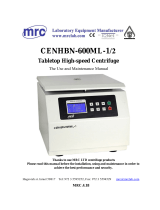2.Installed
A.The native power supply is a single-phase AC110V 60Hz 15A.
B.The power supply should have a safe and reliable wire, strictly
prohibit the ground wire instead of zero line, not to pull the
machine wire indiscriminately.
C.The placement of the site indoor environment non-corrosive gas
relative humidity shall not be greater than 85%, there should be no
other strong vibration source. Thet table surface of the unit should
be rigid and hard enough to support the instrument, the countertop
should be flat without any slope, so that the four rubber soles of the
machine and the table to maintain smooth contact.
3.Introduction to the interface and instructions for use:
1.The centrifuge placed on a solid countertop, four rubber machine
feet should be in good contact with the table surface, shake the
centrifuge with your hand, check whether the centrifuge is placed
smoothly.
2.Open the door cover, the centrifuge tube into the rotor test tube
hole, centrifuge tube must be placed in even symmetry (high-speed
centrifuge centrifuge test fluid should be weighed to join), pay
attention to the rotor cover tight, and re-check whether the test tube
is symmetrically placed, screws are tight.
3.Close the door cover, pay attention to make the door cover
locked, finished by hand to check whether the door cover is closed.
Plug in the power supply and press the power switch.
4.Set speed, temperature, time, rotor number, program, speed-up
gear, speed-down gear: (operator panel diagram below)
can be raised) otherwise long time on the shaft, may rust to death,
the rotor will not be taken out and cause the centrifuge machine
scrap.
6.The life of the native host 6 years, rotor service life of 5 years,
expired should replace the rotor. All rotors must not be used at
more than their maximum speed.
5.Troubleshooting/warranty coverage
Common troubleshooting methods:








